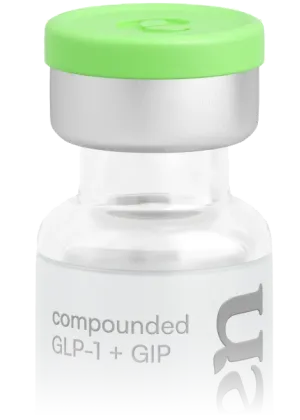Tirzepatide Without Insurance: Options & Costs


Considering tirzepatide without insurance? Learn access options, what providers check, total costs, safety/follow-up, and the key questions to ask first.
- With eligible commercial coverage, manufacturer savings programs may reduce tirzepatide without insurance costs to as little as $25 (terms apply)
- If your commercial plan does not cover Zepbound®, LillyDirect® self-pay vial pricing may be about $349 (eligibility and program rules apply).
- Self-pay options through telehealth or in-person providers typically range from approximately $349 to $650+ per month (dose and program dependent; see vial pricing details below) for FDA-approved branded medications containing tirzepatide.
- Providers must evaluate clinical appropriateness and indication before prescribing.
- Compounded versions exist but are not FDA-approved and carry important legal and safety considerations.
Important note: Compounded tirzepatide has not been reviewed by the FDA for safety, effectiveness, or quality. It may only be prescribed when a healthcare provider determines that FDA-approved alternatives are not suitable for a specific patient.

You may reduce what you pay for tirzepatide even without traditional insurance coverage. Eli Lilly offers both savings support and self-pay pathways for Zepbound® (their branded medication containing tirzepatide), which may lower monthly costs for eligible patients.
Access Without Insurance: Savings, Eligibility & Self-Pay Pricing
For patients with commercial plans that cover Zepbound®, the Zepbound® Savings Card may lower your out-of-pocket costs to as little as $25 per month. If your commercial plan doesn’t cover Zepbound®, you may be eligible to pay as low as $349 for a 1-month supply (program rules and limits apply). The Mounjaro® Savings Card offers similar benefits for eligible, commercially insured patients with Mounjaro® coverage.
Individuals with government-provided insurance (e.g., Medicare, Medicaid, VA, TRICARE) are not eligible for the Zepbound® Savings Card. If you fall into this category, Lilly’s Self Pay Journey Program through LillyDirect® provides an alternative. Transparent vial pricing currently lists $349 for the starter dose (2.5 mg) and $499 for the 5 mg dose, with 7.5 mg and 10 mg available for $499 when you refill within 45 days (otherwise, higher “regular” prices apply; higher doses, 12.5 mg and 15 mg, are also available under program terms).
If you’re paying cash, LillyDirect® single-dose vials may cost less than prefilled pen devices. For comparison, Zepbound® pens currently list at $1,086.37 per prescription fill before any discounts.
Telehealth Access & LillyDirect® Care Pathway
Telehealth platforms offer another option for accessing tirzepatide without insurance, by bundling provider oversight with medication for roughly $299-$600 per month. As mentioned, LillyDirect® is the manufacturer’s digital platform that connects patients with independent clinicians and offers direct pharmacy options for select Lilly medicines, including Zepbound®, with the self-pay vial pricing outlined above.
Where Eden Fits In
Eden coordinates your GLP-1 care from intake to follow-up with transparent, upfront pricing. Licensed providers evaluate whether tirzepatide is clinically appropriate and write prescriptions. Partner pharmacies dispense and label medications. We help you compare access paths (e.g., manufacturer savings, LillyDirect® self-pay vials, or pharmacy cash price).
{{primary-cta}}
Clinical Evaluation Before Prescribing
Your healthcare provider will evaluate whether tirzepatide is clinically appropriate for you for the intended indication before prescribing, regardless of how you plan to pay. You’ll need to meet typical FDA-label indication criteria for Zepbound® (obesity or overweight with weight-related conditions) or for Mounjaro® (type 2 diabetes) and provide current applicable clinical information.
What your provider may check:
- BMI ≥ 30 kg/m2 or ≥ 27 kg/m2 with weight-related conditions
- Age 18 years or older
- Documentation of current weight and BMI within the last 30 days
- Active participation in a diet and exercise program
- No personal history of medullary thyroid carcinoma (MTC) or Multiple Endocrine Neoplasia syndrome type 2
- If you plan to use insurance, any step-therapy requirements from your health plan (for example, proof that you tried and didn’t tolerate or respond to other weight-management medications).
Compounded Tirzepatide: Safety, Legal Status & Availability
Compounded tirzepatide may cost about $250-$500/month, but these products are not FDA-approved for safety, efficacy or quality and may only be prescribed when a licensed provider determines a clinically significant difference for an identified patient. Availability has tightened as GLP-1 shortages resolved and policies continue to evolve.
If you’re looking to go this route, use a state-licensed pharmacy with a valid prescription. For more detailed information, check out our blog “Compounded Tirzepatide: Availability, FDA Status, and Patient Access.”
What “Without Insurance” Usually Means for Tirzepatide
For many people, tirzepatide without insurance typically means you are in one of the following situations:
- GLP-1 medications are excluded for weight management in your insurance plan
- You have a high insurance deductible that hasn’t been met yet
- You’ve had prior authorization denials
- You are currently participating in government insurance (for example, Medicare or Medicaid)
Why monthly costs can rise over time
Expect both one-time and recurring expenses when you’re budgeting for tirzepatide without insurance. Initial costs typically include your first provider consultation (~$50-$300), baseline lab work ($100-$300 if not covered), and your first medication fill at the starting dose.
Ongoing monthly expenses generally include medication refills, follow-up provider visits (typically every 1-3 months, but varies per individual), periodic monitoring labs, and necessary supplies like alcohol swabs. You may also need pen needles/syringes and sharps disposal depending on the product and prescriber directions. Budget roughly $25-$50 per quarter for routine supplies.
Tirzepatide follows a dose-escalation schedule, starting at lower doses and potentially increasing over time. This means your costs may increase several months into treatment as you reach therapeutic dosing. You may also have costs associated with managing side effects or additional monitoring, as directed by your provider.
Tirzepatide out-of-pocket pricing overview (example LillyDirect® medication pricing)
*Timely refill: refill within 45 days to access the $499 pricing at 7.5 mg–15 mg.
Tip: Track both month-to-month spending and a 12-month total so the titration steps, the schedule of follow-up visits, and the lab schedule don’t surprise you financially.
{{primary-cta}}
Safety & Monitoring with Provider-Guided Care
Tirzepatide is not suitable for everyone. You should avoid this medication if you have a personal or family history of MTC or MEN2. You should not use tirzepatide if you are pregnant or breastfeeding. Discuss other contraindications with your provider.
Your provider will determine suitability for treatment during a medication evaluation. This evaluation is particularly important when you’re paying out-of-pocket as it helps ensure you don’t spend money on a medication that may not be appropriate for your situation.
Tirzepatide can cause side effects, typically gastrointestinal, and some people may need extra visits, labs, or supportive medications, which can add to total cost. Discuss risks and monitoring with your provider. Check out our blog for a detailed view of side effects.
Questions To Ask About Cost & Care Before You Commit
Ask your provider (and pharmacist, if helpful) to outline:
- Your monthly and 12-month costs at starter and higher doses
- The schedule and fees for follow-ups and labs
- Whether you qualify for manufacturer savings or LillyDirect® self-pay pricing (and how dose escalation may change those costs)
- The monitoring plan (what’s checked and how often)
- How to judge progress and when your provider may adjust, pause, or stop the medication
- What to do if you have side effects
- What is the contingency plan if costs or coverage change
Conclusion
Tirzepatide without insurance is possible, but costs vary by access path, dose, and monitoring needs. Plan for both monthly and program-level expenses, and confirm details before you start. That way, dose changes, follow-ups, and labs don’t surprise you financially.
If you’re considering compounded options, check out our blog on compounded tirzepatide and speak with your provider about whether that route is clinically appropriate.
Important Note: Compounded tirzepatide has not been reviewed by the FDA for safety, effectiveness, or quality. It may only be prescribed when a healthcare provider determines that FDA-approved alternatives are not suitable for a specific patient.

Blog Components



The FDA does not approve compounded medications for safety, quality, or manufacturing. Prescriptions and a medical evaluation are required for certain products. The information provided on this blog is for general informational purposes only. It is not intended as a substitute for professional advice from a qualified healthcare professional and should not be relied upon as personal health advice. The information contained in this blog is not meant to diagnose, treat, cure, or prevent any disease. Readers are advised to consult with a qualified healthcare professional for any medical concerns, including side effects. Use of this blog's information is at your own risk. The blog owner is not responsible for any adverse effects or consequences resulting from the use of any suggestions or information provided in this blog.
Eden is not a medical provider. Eden connects individuals with independent licensed healthcare providers who independently evaluate each patient to determine whether a prescription treatment program is appropriate. All prescriptions are written at the sole discretion of the licensed provider. Medications are filled by state-licensed pharmacies. Please consult a licensed healthcare provider before making any medical decisions.
Frequently asked questions
Options include manufacturer savings programs, paying cash through telehealth or in-person providers, and, if clinically appropriate, compounded versions. Self-pay vial pricing may be available at LillyDirect®. Costs typically range from about $25 to $699 per month, depending on eligibility, dose, and program terms.
Budget beyond just the medication itself. Dose changes and refill timing can affect vial pricing.
- Medication $349-$1,000+ per month
- Initial visit $50-$300
- Follow-up visits $75-$150 every 1-3 months
- Labs $100-$300 initially and then every 3-6 months
- Plus supplies (e.g., alcohol swabs, pen needles/syringes, and sharps disposal)
Adults, aged 18 or older, with BMI ≥ 30 kg/m2 or ≥ 27 kg/m2 with weight-related conditions (e.g., type 2 diabetes, hypertension) may qualify. You should not use tirzepatide if you have a personal or family history of MTC or MEN2, are pregnant or breastfeeding, or have other contraindications. Your provider will assess your specific health situation.
Common side effects are gastrointestinal (nausea, diarrhea, vomiting, constipation). Some people may need extra visits, labs, or supportive medications, which can add to total cost. For additional details, check out our blog on tirzepatide side effects.
Eli Lilly and Company. (2022). HIGHLIGHTS OF PRESCRIBING INFORMATION. https://www.accessdata.fda.gov/drugsatfda_docs/label/2022/215866s000lbl.pdf
Eli Lilly and Company. (n.d.). Savings & resources | Mounjaro® (tirzepatide). https://mounjaro.lilly.com/savings-resources Mounjaro
Eli Lilly and Company. (2025). Savings card, cost & coverage support – Zepbound®. https://zepbound.lilly.com/coverage-savings
HIGHLIGHTS OF PRESCRIBING INFORMATION. (2023). [Prescribing information]. https://www.accessdata.fda.gov/drugsatfda_docs/label/2023/217806s000lbl.pdf
LillyDirect®. (2025, July). Eli Lilly. https://www.lilly.com/lillydirect/
Zepbound® Check Your Coverage and Costs. (2025, July). https://zepbound.lilly.com/coverage-savings
Eden is an independent healthcare platform and is not affiliated with, sponsored by, or endorsed by Eli Lilly and Company, the maker of Zepbound® and Mounjaro®.
Thank you!
We'll be in touch.
Thank you!
























